
Charlie Warzel / BuzzFeed News / Facebook
Facebook is lousy with opportunities for embarrassment. An offhanded political remark that silently — and completely unbeknownst to you — escalates tensions with an opinionated family member and preemptively ruins an upcoming Thanksgiving dinner. A glory-days photograph commemorating an regrettable decision to stay out well past last call. Old connections with the acquaintances of an ex that prompt a Cold War–style standoff of mutually assured "friendship." These social hiccups are almost universal and easily written off as an unfortunate side effect of a platform that is constantly, relentlessly asking you to feed it data and, at the end of every scroll, baiting you to forge new connections while connecting you to people you like and love in sometimes power ways.
Which is precisely how last week I invited just over 240 people to help me plan a birthday party for a man I’d met just twice.
The party was born out of a rash experiment, one intended as a sort of proof-of-concept review of Facebook’s shadowy algorithms — the complex bits of machine learning that invite us to read, post, share, friend, and like, the scaffolding upon which our Facebook personas are built. If the prompts from Facebook’s sharing and friending algorithms are the purest expressions of how the network wants its users to use the service, then following their every request could — theoretically — create the platonic ideal of the company’s social networking experience.
So, for a few weeks, I did everything Facebook’s algorithms told me to do. No friend request, no post, no overshare was off limits.
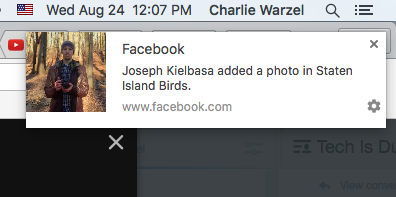
Charlie Warzel / BuzzFeed News / Facebook
For its 1.7 billion users, Facebook is arguably a pervasive digital identity. Because the company requires people to register with their real names, it's used as a digital ID vouching for us to myriad apps and online services requiring authentication. By virtue of scale, Facebook is typically the digital platform on which you're most likely to encounter members of your extended family. It's often used by employers and college admissions officers to vet candidates. And because of that, on Facebook we often put forth a stylized, maybe somewhat idealized version of ourselves.
Facebook's evolution from college picture repository to ubiquitous social platform occurred alongside a tectonic shift in our attitudes toward the sharing of personal information online. A roiling estuary of privacy concerns, changing social norms, and competitive pressures inspired a decline in intimacy that Silicon Valley and its close observers call "context collapse” (very broadly speaking: The way we use a social network changes based on the audience of that social network).
Facebook was inviting me to engage. And engage, I did.
Back in April, that collapse was reported to have caused a 21% year-over-year drop in original personal sharing on Facebook. It was right around this time that I began noticing a sudden uptick in Facebook prompts suggesting that celebrate an obscure holiday or post about a live event. A Facebook spokesperson told me that the company began testing these kinds of prompts in the feed about 18 months ago and has steadily ramped up their presence ever since. Facebook was inviting me to engage. And engage, I did.
The first few days were a breeze; Facebook asked very little of me as I generally use it sparingly, giving the network and its algorithms little in the way of prompting data. At one point though, probably over a decade ago, I had declared my allegiance for the Cleveland Indians in the form of a throwaway Facebook Like. And so one evening, early into the experiment, I opened Facebook to find the live score of a mid-August Indians game at the top of my feed with a friendly suggestion to let my friends know if I was watching the game. So on Aug. 16, I tacked on a quick bit of commentary — “fun!” — and posted what would eventually become a 1–3 loss to the Chicago White Sox into the feeds of the roughly 650 people who trusted me to be their friend.
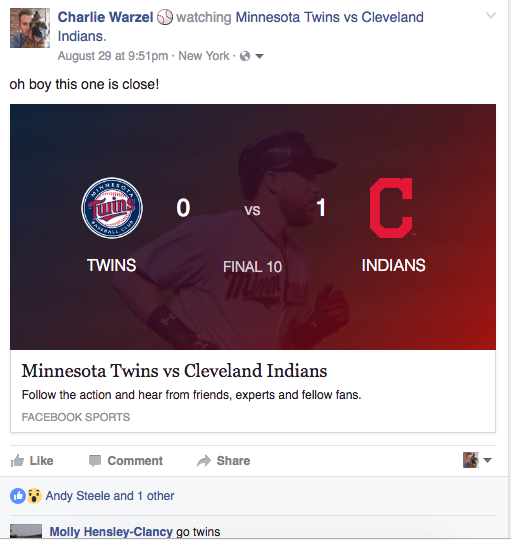
Charlie Warzel / BuzzFeed News / Facebook
The response was, to be generous, tepid. It occurred largely off-Facebook, mostly in the form of frustrated texts. “Stop whatever you’re doing with the indians please k," read one. This went on for a few days. Facebook — with the reliability of a baseball-obsessed, Barcalounger grandfather — delivered game scores to me daily, convinced that I cared enough to share them with my friends. I didn't care. But I shared them anyway, and in so doing became a sort of unwanted and overly specific ESPN, reporting box scores with ironic captions. All the while Facebook cheered me on: You and 1,218,967 others like Cleveland Indians, it reassured, as if to remind me that, somewhere out there, there truly was an audience for my shitposts.
Smelling blood in the algorithmic waters, Facebook began prompting me to weigh in on all kinds of odd moments. And so I celebrated 177 years of photography; I thanked some Olympians for their service; I commemorated the 25th anniversary of the commercial internet. One day I marked the three-year anniversary of a friendship between myself and a co-worker, and later reflected on 100 years of “breathtaking views” from our nation’s national parks. Every morning, it seemed, Facebook had something new for me to appreciate. As with the baseball scores, I started off with a quip as preface: “i love taking pictures with my phone!” but quickly decided — after another disgruntled text — to use the opportunity to attempt to talk to my Facebook friends. I would be sincere in my service to the algorithm.
On the 25th anniversary of the internet I earnestly rattled off a few words about how I found it comforting that I was older than something as powerful and unknowable as the web. A few friends chimed in to agree; no passive-aggressive text messages from friends followed. So I continued. A day or two later, I commented on an Indians score, confessing I felt like a fraud as a baseball fan, since I watch very few games until the playoffs. My friends, surprisingly, took the bait. “i have this conversation a lot... i think with baseball, it's ok to be a fair weather fan because of the volume,” one said. Another agreed while a third went off about identity politics. A few others reassured me that I could still call myself a fan — and only one did so ironically. At Facebook's behest, I was having an approximation of a real-life conversation with a bunch of people, some of whom were good friends I hadn’t spoken to in while.
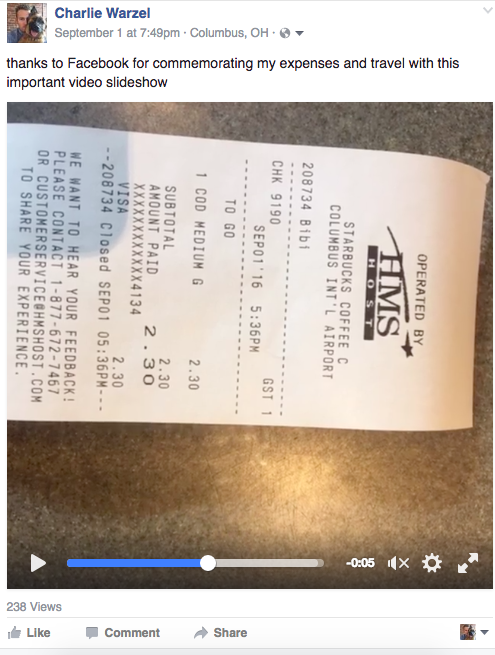
Charlie Warzel / BuzzFeed News / Facebook
That said, Facebook’s status prompts always, always, felt like ham-handed pleas for artificial engagement. They read like Google Doodles with a text-entry field. Which is hardly surprising: Facebook is, after all, an advertising machine driven largely by the vast reams of data it collects from its users. The company posted $6 billion in ad revenue in the second quarter of 2016 alone (for reference, NBC’s broadcast division did $2.1 billion in revenue in the second quarter of 2016).
So it makes sense that the influence of Facebook’s targeted marketing business, which, for some, could be an incentive to share less personal information, might bleed into the company’s efforts to increase sharing. Viewed through the lens of Facebook’s algorithmic prompts, the company’s ideal user doesn’t just engage frequently, and signal preferences with likes, but publicly and incessantly and enthusiastically interacts with their favorite brands — from major league sports teams to greeting card holidays.
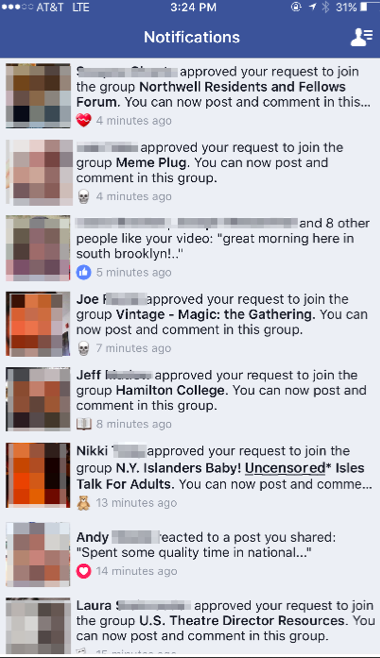
To my surprise, almost everyone let a perfect stranger into their Facebook group.
Charlie Warzel / BuzzFeed News / Facebook
A couple of weeks in I realized my definition of a Facebook prompt might be a little too narrow. Staring at my News Feed, I realized I was surrounded by fiendish algorithmic cues. I clicked the red dot next to the Friend Request silhouette and found an inbox of horror waiting. “Accept Request” buttons from roughly six years of ignored requests. I clicked them all — over 100 in total. Within minutes a handful of nice Turkish men appeared in my inbox to thanking me for belatedly accepting their requests. A public relations person promptly pitched me on an app. A photo-less avatar messaged me simply, “Who?” The feeling was mutual.
“You're ruining your life right now.”
Then came "Suggested Friends." My stomach dropped at the list of people who Facebook — quite accurately — predicted I knew. In wicked, Dickensian fashion, Facebook served up the ghosts of my past, present, and future: a laundry list of people I’d known well and wanted to forget; others who I do know, but not to the extent that I want a Facebook window into their lives; and a few I really did want to know, but didn’t know well enough to friend. There were, among a lot of others: an ex-girlfriend my college roommate dated six years ago for a couple months, a co-worker I’d met once in passing in the hallway, a few quasi-famous media types I’d read or seen on TV or something. Request, request, request. After each one I was prompted by Facebook to send them a hello message. For most, I sheepishly typed something robotic and friendly that might fool my confused new friends into thinking it was an auto-generated message. None replied. One night, while on a particularly deep friending run, I cringed physically after friending BuzzFeed’s president — a lovely man I’ve met only in passing. My girlfriend looked at my screen and then at me. “You're ruining your life right now,” she said.

Charlie Warzel / BuzzFeed News / Facebook
I became king of birthday wishes. I joined dozens of suggested Facebook groups: a Staten Island birdwatching society, which alerted me via push notifications every time Joseph Kielbasa posted a great photo of a heron; an adults-only New York Islanders fan group; seven different yard sale marketplaces in the tri-state area; three natural childbirth groups; a couple silly viral video pages; and some good Magic: The Gathering meeting places. None denied me, not even a certain Brooklyn College’s class of 2008 Republicans group (I did not attend this college; I didn’t even graduate in 2008). Facebook invited me to like a bunch of pages in a bizarrely nonsensical progression: first news reporters; then blonde local TV reporters; and finally chesty, models and scantily clad female bodybuilders. Meanwhile, the company’s algorithms seemed to interpret my flurry of on-platform activity as that of a man hungry for more.
So, in early September, Facebook suggested I throw Patrick a birthday party.
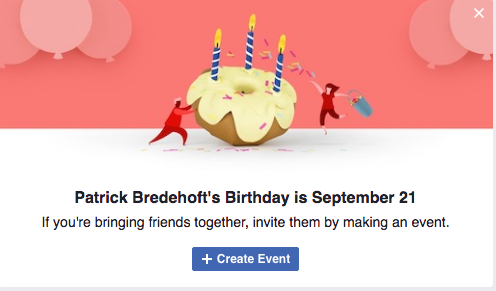
Charlie Warzel / BuzzFeed News / Facebook
Before June 23 of this year, I didn’t know Patrick existed.
The birthday party prompt appeared less than a third of the way down my feed alongside a little cartoon-y cake, and a friendly, but near-passive-aggressive call to action: “If you’re getting together September 21st, why not invite friends by making an event?” This might seem like a simple, vanilla suggestion, were it not for the fact that before June 23 of this year, I didn’t know Patrick existed, and since that time, I've met him only twice. This isn’t to say I don’t think the world of Patrick, I do. We got along instantly, share a lot of interests, and crack similar jokes; that's why I friended him on Facebook after we first met in late June. But there’s plenty I don’t know about Patrick and can't easily learn, even from his Facebook profile — all of the silly little intangible micro details, the shared experiences and secrets accumulated over a friendship through which you come to know someone. And yet despite that very tenuous connection, Facebook determined that I was somehow qualified to orchestrate Patrick's birthday party — a celebration with his friends and mine, and no, it wouldn't be awkward at all.
Weirdly, Facebook was kind of right. Patrick and I don’t live in the same city and, because I’ll be away during his birthday, I created the event, explicitly stating that it had been algorithmically suggested that I throw him a party. I invited over 250 people I knew and kept the invite list open so Patrick’s friends could add themselves and others; I set up a little donation page where people could PayPal him booze money for a party. And then, slightly mortified, I waited.
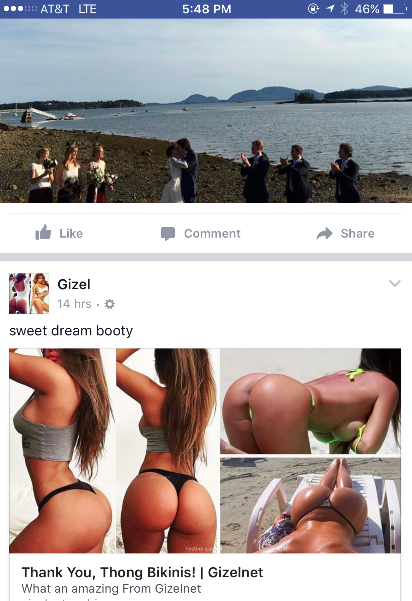
My feed was ruined — a mix of wedding pictures of friends and chesty lingerie models Facebook asked me to follow...
Charlie Warzel / BuzzFeed News / Facebook
My invitation was met largely with bemused befuddlement and a bit of honest confusion. “What the actual fuck is this," a friend of mine wrote on the event wall before exiting gracefully with “I unsubscribe with extreme prejudice.” Other mutual friends of ours traded in-jokes. I began to receive text messages asking if the party was real, which, sure! The whole thing was ridiculous, but everyone seemed to be having fun. As of this writing, we’ve raised $55 in party funds for Patrick. I’m weirdly hopeful people will really, truly get together as a result.
I wonder now if Facebook’s watchful eye had sensed a possible friendship between us prior to its suggestion that I plan the party. I had stalked Patrick on Facebook after we’d met, looking up where he’d gone to college since I'd forgotten to ask. Patrick, meanwhile, had shared an article of mine along with a genuine compliment and I liked the update. We'd both been tagged in a picture from the party at which we met. In other words, we'd fed Facebook's algorithm a bunch of subtle cues suggesting a connection. And so Facebook did exactly what you might expect a matchmaker to do when it’s guided only by raw data and snippets of expensive proprietary code: It abandoned all social graces and ran what looked like a possible, nascent friendship through a particle accelerator. And, it kinda worked.

Charlie Warzel / BuzzFeed News / Facebook
Facebook’s algorithms are thirsty. They take few social cues. They don’t wait three days to text you after a first date, they video-chat you from the bathroom before the date is over because they miss hearing your voice. And that’s problematic given Facebook’s proclivity for miscalculating the wants of its users and its well-documented tendency to overshare on their behalf. In 2010 Facebook changed its privacy settings to make status updates public by default. It has outed people because it assumed that’s information was intended to be shared. It once banned pseudonyms and then reversed that ban after outcry from transgender individuals and victims of domestic abuse. It’s even manipulated its users’ emotions without telling them, thinking it ok, as it was in service of a better user experience.
My experience doing everything Facebook asked of me was similarly fraught. I polluted my friends’ feeds with trivial information. I made what were almost certainly awkward friend requests. I overshared — ferociously. When Facebook suggested I create a slideshow out of some recently taken photos, I posted a short video featuring pictures of receipts for an expense report set to some snappy theme music. What began as a silly prompt very quickly turned into what felt like distinctly like a greedy ploy for more and more data. Facebook's algorithm may have correctly flagged my pre-friendship with Patrick, but more often than not it was a blunt, unintelligent instrument that assumed all passing fancies were deep obsessions.
I’ve since stopped following Facebook's prompts, but the aftershocks of my experiment continue even now. My rash of friend request acceptances has inspired a marked uptick in random men (many hailing from Turkey) asking to be friends. My feed is a mess of alerts from obscure Facebook groups, and any time Patrick likes a photo it sits atop my News Feed with the staying power of an engagement announcement.
There was something reassuring, even calming about staring down Facebook's algorithmic firehose, mouth open. For all its billions of users, its towering piles of cash, its army of brilliant engineers, the company is still no stand-in for a human being — not even close. Sure, Facebook knew more about what I wanted than I’d given it credit for, but very little about who I am. I'd been telling Facebook about myself for over a decade, but in the end it only listened to what it wanted to hear.
from BuzzFeed - Tech https://www.buzzfeed.com/charliewarzel/i-let-facebooks-algorithms-run-my-life-for-weeks?utm_term=4ldqpia
No comments:
Post a Comment